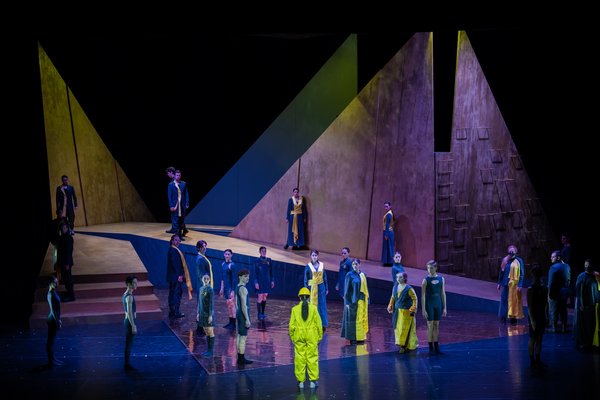
DIDO AND AENEAS – MVM OperAdventure
12 March 2024, 10:30 a.m.
In Brief
Opera in three acts, one part, in English, with Hungarian and English surtitles
Henry Purcell’s epic masterpiece, Dido and Aeneas has to do with the Trojan War. But what is even more important than the historical background of this hour-long little gem is love – as Dóra Barta, the director of the production highlights it, “Humanity has long known that if there is something you can die of, Love is certainly such a thing. Whether it is happy or not, returned or unrequited, one thing is sure: it is dead serious business. The tragic-ending romantic affair enfolding between the queen of Carthage and the Trojan hero was made into a grand classic of universal cultural history by Virgil, but it was the thirty-year-old Henry Purcell whose music made its heroes rise to the stars, among which they have been shining with never fading light for three and a half centuries now.”
Details
- Location
- Eiffel Art Studios – Miklós Bánffy Stage
- Date
- March 12, 2024
- Start time
- 10:30 a.m.
- End time
- 11:40 a.m.
Synopsis
Act I
Under the rule of Dido, the queen of Carthage, who is in possession of great creative power, the city grows and prospers. Nevertheless, she has been consumed by melancholy for some time, and she is unsure if she can find peace ever again. What could be wrong? After all, the empire has never been so fortunate. Belinda, the queen's lady-in-waiting, suspects the reason: Dido has fallen in love with Aeneas, the Trojan warrior enjoying their hospitality after fleeing to Carthage following the fall of Troy. Perhaps even Dido fears of admitting the truth to herself, being afraid of loss and pain, being afraid of weakening as a leader if she succumbs to her emotions. However, the ladies of the court encourage her: it would be beneficial politically if Troy and Carthage were united. Moreover, Aeneas also seems to be in love with Dido. When the hero appears, Dido first gives him the cold shoulder, but later she cannot control her emotions and surrenders herself to love, while a never-ending doubt starts a certain internal destruction in her soul.
Act II
Scene 1
Happiness is never easy: dark shadows appear, the Sorceress can no longer bear to look upon the success of the empire and Dido's happiness. Therefore, she decides to put an end to both. He calls her witches for help and shares her plan with them: the evil spirit appearing in the image of Mercury, the messenger of the gods will let Aeneas know that he must set out immediately. This will cause Dido to despair and die of her pain, and Carthage will be consumed by flames. The witches improve the excellent plan with another idea: they will conjure up a storm around the lovers while they are hunting, thus separating them in order to carry out the evil deed.
Scene 2
Dido és Aeneas boldogan vetik bele magukat a vadászat élvezeteibe, Dido azonban mennydörgést hall, és véget ér a szórakozás. Visszatérnek a palotába, Aeneast azonban megállítja Merkúr, azaz a Varázslőnő-féle ártó szellem, és közli vele, hogy még ma éjjel útra kell kelnie, hogy Itáliában megalapítsa az új Tróját. Aeneas nem tehet mást, engedelmeskedik az isteni akaratnak, csak azt nem tudja még, hogyan mondja el mindezt szelemének...
Dido and Aeneas happily indulge in the pleasures of hunting, but Dido hears the thunder, which puts an end to their fun. They return to the palace, but Aeneas is halted by Mercury, i.e. the evil spirit of the Sorceress, who tells him that he must set out tonight to establish the new Troy in Italy. Aeneas has no other choice than to obey the divine command, but he has no idea yet how to tell his lover...
Act III
Scene 1
The sailors bid farewell to their casual lovers and prepare for the long voyage. The Sorceress and her witches are satisfied, their plan is going well. The Sorceress comes up with another idea: she will make Aeneas die in the sea during a storm to complete the guile.
Scene 2
A palotában Dido úgy érzi, kezdeti félelme alapos volt, beteljesült, amitől félt, ami miatt nem akarta átadni magát a szerelemnek. Belinda sem tudja megnyugtatni. Aeneas érkezik búcsúzni, ám Dido már leszámolt magában ezzel a viszonnyal. Látva a nő kétségbeesését, Aeneas maradna, megtagadva az isteni (pontosabban isteninek hitt) parancsot, Dido azonban hajthatatlan, már nem akarja folytatni ezt a viszonyt. Miután Aeneas távozik, a valaha erős királynő elgyöngül, összeesik, nem marad más számára, mint a halál, hiszen a föld alatt nem fogja semmi baj érni, nem kell hasonló gyötrelmekkel szembenéznie, mint amiket ez a szerelem okozott neki. A többiek búcsút vesznek tőle, remélve, hogy sírja fölött a szerelem istene maga fog őrködni.
In her palace, Dido feels that her initial fear was well-founded. The thing she was afraid of, the reason she did not want to succumb to love has come to pass. Even Belinda cannot comfort her. Aeneas comes to say goodbye, but Dido has already given up on this relationship. Seeing her desperation, Aeneas would stay refusing the divine (or what he believed to be divine) command, but Dido is adamant. She no longer wants to continue this relationship. After Aeneas leaves, the once strong queen weakens, collapses, there is nothing left for her but death, since nothing will harm her in her grave, she will not have to face similar torments to what this love brought her. The rest say goodbye to her hoping that the god of love himself will watch over her grave.
Gallery
Reviews
"The production, which took place at the Miklós Bánffy Stage in Eiffel Art Studios, was an opportunity to show the Hungarian State Opera working on a more intimate scale than usual, intended to be a point of introduction to opera for a younger generation – a nod, as director Dóra Barta stated in her programme note, to the work’s historical origins as an opera composed for a girls’ school. There was nothing ad hoc or ‘studenty’ about this Dido, however. This was a staging of Purcell’s opera with high production values, stylish music-making and superb singing."
Ashutosh Khandekar, Opera Now
